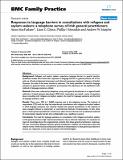| dc.contributor.author | MacFarlane, Anne | en |
| dc.contributor.author | Glynn, Liam G. | en |
| dc.contributor.author | Mosinkie, Phillip I. | en |
| dc.contributor.author | Murphy, Andrew W. | en |
| dc.date.accessioned | 2010-10-13T15:53:08Z | en |
| dc.date.available | 2010-10-13T15:53:08Z | en |
| dc.date.issued | 2008 | en |
| dc.identifier.citation | MacFarlane A., Glynn L.G., Mosinkie P.I. and Murphy A.W. (2008)'Responses to language barriers in consultations with refugees and asylum seekers: a telephone survey of Irish general practitioners'BMC Fam Pract 2008, 9:68 | en |
| dc.identifier.uri | http://hdl.handle.net/10379/1321 | en |
| dc.description.abstract | Background:
Refugees and asylum seekers experience language barriers in general practice. Qualitative studies have found that responses to language barriers in general practice are ad hoc with use of both professional interpreters and informal interpreters (patients' relatives or friends). However, the scale of the issues involved is unknown. This study quantifies the need for language assistance in general practice consultations and examines the experience of, and satisfaction with, methods of language assistance utilized.
Methods:
Data were collected by telephone survey with general practitioners in a regional health authority in Ireland between July-August 2004. Each respondent was asked a series of questions about consulting with refugees and asylum seekers, the need for language assistance and the kind of language assistance used.
Results:
There was a 70% (n = 56/80) response rate to the telephone survey. The majority of respondents (77%) said that they had experienced consultations with refugees and asylum seekers in which language assistance was required. Despite this, general practitioners in the majority of cases managed without an interpreter or used informal methods of interpretation. In fact, when given a choice general practitioners would more often choose informal over professional methods of interpretation despite the fact that confidentiality was a significant concern.
Conclusion:
The need for language assistance in consultations with refugees and asylum seekers in Irish general practice is high. General practitioners rely on informal responses. It is necessary to improve knowledge about the organisational contexts that shape general practitioners responses. We also recommend dialogue between general practitioners, patients and interpreters about the relative merits of informal and professional methods of interpretation so that general practitioners' choices are responsive to the needs of patients with limited English. | en |
| dc.format | application/pdf | en |
| dc.language.iso | en | en |
| dc.publisher | BioMed Central | en |
| dc.rights | Attribution-NonCommercial-NoDerivs 3.0 Ireland | |
| dc.rights.uri | https://creativecommons.org/licenses/by-nc-nd/3.0/ie/ | |
| dc.subject | General practice | en |
| dc.title | Responses to language barriers in consultations with refugees and asylum seekers: a telephone survey of Irish general practitioners | en |
| dc.type | Article | en |
| dc.local.publishedsource | http://www.ncbi.nlm.nih.gov/pmc/articles/PMC2637872/ | en |
| dc.description.peer-reviewed | peer-reviewed | en |
| dc.contributor.funder | Health Research Board | en |
| nui.item.downloads | 902 | |


